7 Dietary Sources Of Amino Acids And Their Benefits
There is no better way to ensure long-term physical stability and immunity than incorporating these into your diet.
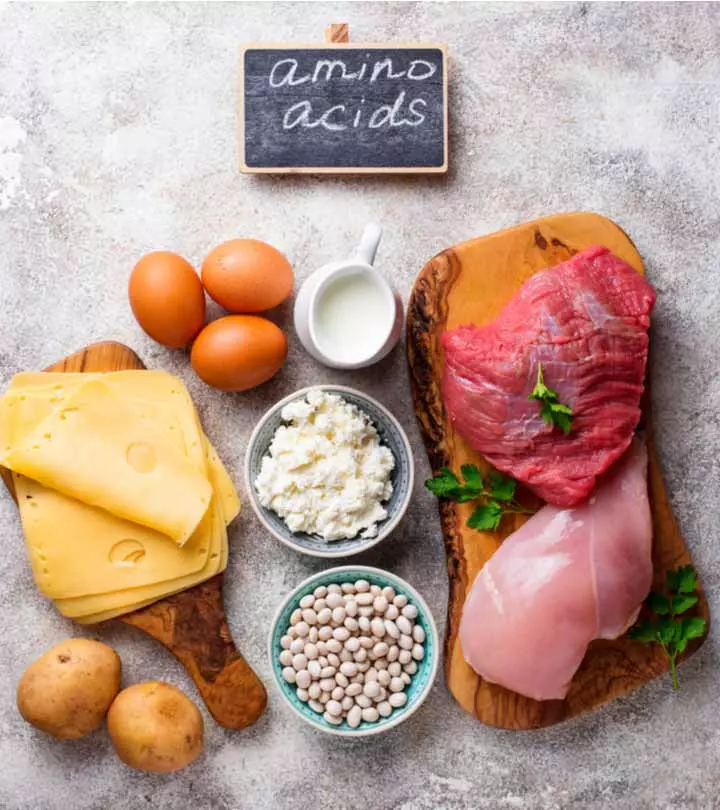
Image: Shutterstock
Proteins are large molecules responsible for almost every major function in the body. They build muscle, boost immunity, play a role in the synthesis of hormones, and even may help with weight management. Proteins are made of several amino acids majorly categorized as non-essential and essential. While the non-essential amino acids can be synthesized in the body, the essential amino acids cannot be. Hence, it is important to consume foods high in these amino acids.
In this article, you will learn about some of the best sources of essential amino acids, their benefits, and the potential side effects of taking them as supplements. Keep reading.
In This Article
Essential Amino Acids And Their Types
Amino acids are the building blocks of proteins. Amino acids and proteins influence some of the major functions in your body and are responsible for effectively maintaining muscle, bone, and other lean tissues (1).
As many as 20 amino acids make up the body proteins. Amino acids are classified as essential, non-essential, and conditional (2).
Dr. Sunjya Schweig, MD, the founder of the California Center for Functional Medicine, says, “Nine of the 20 essential amino acids are ‘nutritionally indispensable,’ meaning our body cannot make them. These are histidine, isoleucine, leucine, lysine, methionine, phenylalanine, threonine, tryptophan, and valine. We have to get them from our food.”
“An additional six essential amino acids are considered ‘conditionally indispensable.’ Although the body can make these from other amino acids, they are insufficient. Hence, these amino acids likely need to come from dietary sources. The final five amino acids are ‘nutritionally dispensable’,” says Dr. Schweig.
Essential amino acids can easily be supplied to your body through food and supplements. But which foods are high in them? Continue reading to know.
Almost all foods have protein. This protein is broken down to supply your body with the essential amino acids. The easiest way to get these amino acids is by consuming a high-protein diet filled with seafood. However, Dr. Schweig suggests that seafood must be interspersed with other meats as well for better results. He recommends the following foods for each of the amino acids:
Essential Amino Acid | Foods To Eat |
Histidine | Poultry, fish, dairy, beans, eggs, cauliflower, mushrooms, bananas |
Isoleucine | Seaweed, turkey, chicken, fish, lamb, cheese, eggs |
Leucine | Hemp seed, beef, fish, almonds, chicken, eggs, beans, lentils, milk, rice |
Lysine | Red meat, pork, poultry, cod, sardines, eggs, fenugreek seeds |
Methionine | Eggs, fish, Brazil nuts, sesame seats, muscle meat |
Phenylalanine | Beef, pork, poultry, dairy products, eggs, nuts, seeds |
Threonine | Dairy foods, fish, poultry, meat, lentils, sesame seeds, mushrooms, leafy vegetables |
Tryptophan | Eggs, fish, turkey, chicken, beef, lamb, sunflower seeds, sesame seeds |
Valine | Dairy products, nuts, seeds, fish, beans, mushrooms |
Animal protein has all nine essential amino acids, making it a complete protein. However, most plant proteins are incomplete. If you are on a vegan diet, you have to consume a variety of plant proteins to get all the essential amino acids for your body (3).You can also follow complementation, where you match a certain food low in an amino acid with another food high in that specific amino acid. Examples include complementing grains and legumes (for lysine, methionine, and tryptophan), grains and dairy (for lysine), or legumes and seeds. In terms of food, this could mean having lentil soup with whole wheat rolls, spinach salad with beans and sunflower seeds, or crispbread with low-fat cottage cheese.
Studies recommended a protein intake of 0.8g/kg of body weight for adults under the age of 65 (4).
The foods with amino acids mentioned above can be broadly classified into seven categories:
1. Seafood
Fish like herrings, mackerels, mahi-mahi, salmon, and other shellfish are usually great sources of protein. Eating seafood is beneficial for overall health as it contains omega-3 fatty acids, selenium, iodine, high potassium, and low sodium concentrations, vitamins D, A, E, and B12, and taurine (5). Besides, seafood intake may help maintain heart and brain health (6).
 Did You Know?
Did You Know?2. Lean Meats
Chicken, beef, turkey, venison, and tenderloin (all without any visible fats) are important high-protein foods. They provide your body with selenium, vitamins B3 and B6, and choline. Lean meats may also help reduce weight as they have fewer calories than full meats. Intake of poultry meat may also help reduce the risk of cardiovascular disease and diabetes (7).
3. Low-Fat Dairy Products

Milk, yogurt, and other dairy products are extremely rich in amino acids, calcium, riboflavin, potassium, magnesium, vitamins A and B12, zinc, and choline. Dairy products may help build strong bones and muscle, and maintain blood pressure as they are rich in calcium (8).
4. Eggs
Eggs are an excellent source of protein, copper, iron, iodine, magnesium, manganese, selenium, and zinc. There are a total of 550 distinct proteins in the egg-white and yolk. Besides, they have antimicrobial, antioxidant, and anti-cancer properties (9). Egg white protein was also found to improve muscle strength and increase immune cell activities (10),(11). Moreover, a moderate intake of eggs (one egg per day) was shown to lower the risk of cardiovascular disease among Asians (12).
Chris Heria, a fitness vlogger, shares a few healthy egg recipes. In his video, he says, “Eggs have always been a very important ingredient in my diet when it comes to building solid lean muscle while simultaneously burning fat and getting shredded (i).”
5. Legumes
Legumes like green peas, beans, lentils, and chickpeas are the best protein sources if you are on a plant-based diet. Black-eyed peas, cannellini, cranberry, and beans like Great Northern, kidney, lima, mung, navy, pinto, and soy can be the perfect addition to your dishes. These legumes help control blood sugar levels and reduce cholesterol and high blood pressure. These functions, in turn, help reduce the risk of cardiovascular disease (13).
6. Grains

Grains and pseudograins like quinoa provide your body with proteins and most of the essential vitamins and minerals. Studies suggest that dietary whole grain intake may help reduce the risk of type 2 diabetes, cardiovascular disease, and colorectal, pancreatic, and gastric cancers. The findings recommend a daily whole grain intake of 2 to 3 servings (~45g) (14). Whole grains such as oats and brown rice also contain dietary fiber that can help reduce cholesterol, improve gut health, and reduce the risk of heart disease (15).
7. Nuts And Seeds
Pumpkin seeds, chia seeds, flax seeds, sesame seeds, poppy seeds, sunflower seeds, buckwheat, and hemp seeds provide essential amino acids. They are also rich in calcium, manganese, magnesium, potassium, plant iron and zinc, and dietary fiber. As a result, they may help reduce cholesterol, maintain blood pressure, and may reduce the risk of heart disease and diabetes.
Nuts like almonds, cashews, walnuts, pistachios, pine nuts, pecans, hazelnuts, and macadamias have a similar nutritional profile as the seeds mentioned above. Besides, they are high in monounsaturated fatty acids and have phytochemicals (plant chemicals) with antioxidant properties (16). as well as vegetarian sources like spirulina and chlorella
All these foods help your body get the essential amino acids naturally. However, you can also consider taking supplements. Let us explore how these supplements benefit your health in the following section.
Key Takeaways
- You need to eat protein-rich foods to get the essential amino acids that your body cannot produce naturally.
- Increase your intake of seafood, dairy products, nuts, seeds, meat, fruits, and vegetables to increase your protein and amino acids count.
- You can also take amino acid supplements that build muscle mass and reduce muscle soreness.
- However, these supplements may cause nausea and affect your blood sugar levels.
Benefits Of Taking Amino Acid Supplements

“These supplements are often essential for athletes to build the necessary muscle mass required by their body to make up for the ensuing physical exertion,” says Abe Breuer, a New York State Emergency Medical Technician.
Amino acid supplements are usually available as branched-chain amino acids (BCAAs).
Some of their benefits include:
- Increasing antioxidant activity in the body (17).
- Improving muscle mass (17).
- Reducing muscle soreness after exercise (18).
- Improving appetite (19).
- Reducing symptoms of hepatic encephalopathy (loss of brain function due to buildup of toxins in the blood following liver cirrhosis)(20).
- Maintaining symptoms of phenylketonuria, a disease caused by deficiency of an enzyme that converts phenylalanine (amino acid) into tyrosine (also an amino acid) (21). The dietary supplements are specialized in this case.
 Quick Tip
Quick TipWhile the supplements can positively impact your body, they can be disadvantageous as well. Some experts have weighed in on the drawbacks of taking amino acid supplements. Let us look at them.
Risks Of Taking Amino Acid Supplements

“Amino acid supplements can impact your blood sugar levels. This means that you should avoid them before and after surgery. Many experts advise against taking supplements that contain a single amino acid,” warns Nadia Charif, a health and fitness adviser.
Breuer says, “Amino acid supplements carry a significant risk of inducing side effects like nausea, bloating, unstable blood pressure, gastrointestinal issues, and so on. Moreover, they easily react with other medications and should not be used without consulting a medical expert.”
“Higher protein intake can also increase blood sugar levels. So, someone dealing with unstable blood sugar or diabetes may want to consult their healthcare provider before starting a supplement,” says Amy Goodrich, registered dietitian nutritionist and the owner of Leading Edge Nutrition LLC.
But what about weight? Can amino acids lead to weight gain? Let us find out.
Do Amino Acids Make You Gain Weight?
There are no studies that state that amino acids may make you gain weight. In fact, an animal study showed that certain amino acids may help reduce obesity by positively impacting insulin sensitivity and metabolism (22).
Weight gain or loss depends on the number of calories you consume versus the number of calories you burn daily. If you consume more calories but follow a sedentary lifestyle, you are most likely to gain weight regardless of whether those calories come from amino acids or any other macronutrient. However, research suggests dietary protein may reduce the risk of fat gain when combined with resistance training during high food intake (23). So, if you are consuming a high amount of amino acids, ensure to couple it up with exercise and a healthy lifestyle.
Sometimes, your body may drop certain hints flagging the insufficient intake of protein. What are they?
Signs You Are Not Getting Enough Protein

Some of the visible signs of protein deficiency are:
- Edema or fluid buildup in your limbs (24)
- Muscle wasting (muscle atrophy) (25)
- Anemia (26)
- Slow growth in children(27)
According to the World Health Organization (WHO), 29.9% of women (equivalent to over half a billion women) between 15 – 49 had anemia in 2019. It was further estimated that the global prevalence was 29.6% in non-pregnant women and 36.5% in pregnant women.
Matt Scarfo, a NASM-certified fitness nutrition specialist, says, “If you are not getting enough protein, you may experience swelling in your legs, feet, and hands besides fatigue and slow-healing injuries.”
“Common symptoms of amino acid deficiency include lapse in concentration, fatigue, memory loss, general weakness, mood swings, and food cravings, especially on unhealthy grabs,” informs Tom Miller, a fitness trainer and a content strategist at FitnessVolt.
Hence, look for any symptoms that your body might show as they could be signs of protein deficiency.
Infographic: Top 5 Foods Rich In Amino Acids
Amino acids are the building blocks of protein. They play a crucial role in boosting muscle mass and increasing antioxidant activity in the body. While some amino acids are created in the body, others need to be obtained from food. Check out the infographic below for the top food sources of amino acids and how they benefit your health.

Illustration: StyleCraze Design Team
Amino acids, the building blocks of protiens, play many important roles in the body, and you need to maintain their levels to avoid negative consequences. Because the body cannot produce essential amino acids on its own, they must be acquired through diet or supplements. Consume foods high in amino acids, such as nuts and seeds, seafood, lean meats, legumes, and beans. You can also incorporate dairy and eggs into your diet. If you eat a plant-based diet, consume extra cereals and grains in addition to nuts, seeds, veggies, tofu, spirulina, chlorella, and beans. In addition, if your doctor recommends it, you can take amino acid supplements. However, you should be aware of any possible adverse effects of amino acid supplementation.
Frequently Asked Questions
What causes amino acid deficiency?
The main cause of an amino acid deficiency is insufficient protein intake. Proteins break down and form amino acids. So when you ingest less protein, it causes a decrease in amino acid production. Other causes include antacids and aging.
Do blueberries have amino acids?
Blueberries contain a high amount of the amino acid arginine.
Do fruits have amino acids?
Yes, fruits do contain amino acids. Fruits like bananas, berries, mandarins, oriental melons, and white peaches contain amino acids.
Can you have too many amino acids?
Large amounts of amino acids can affect the enzymes in the liver and the rest of the body, the nervous system, eating patterns, and toxicities.
Illustration: Foods High In Amino Acids And Their Benefits
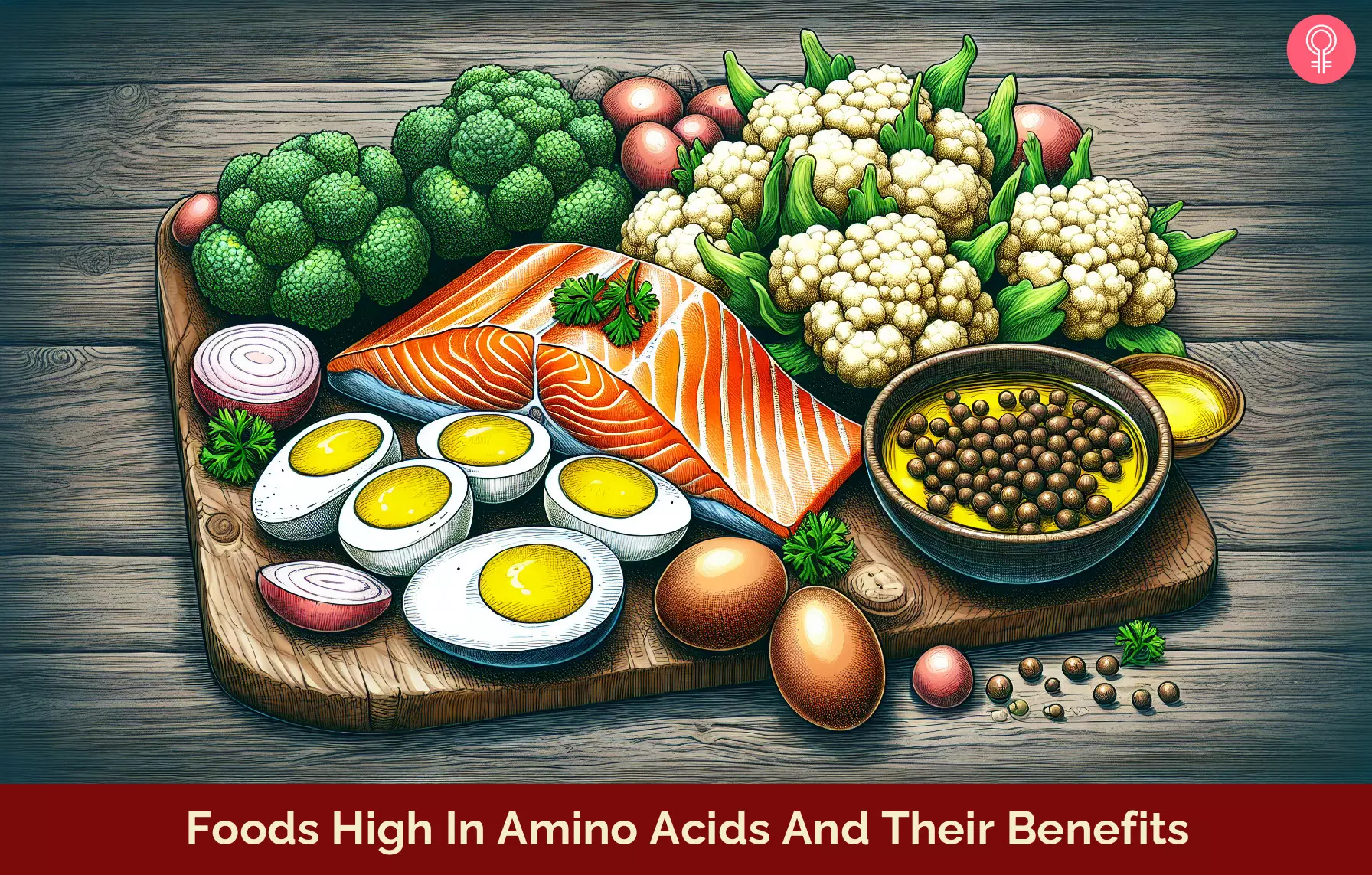
Image: Stable Diffusion/StyleCraze Design Team
Check out this video to learn about 10 amazing foods high in amino acids that you should be eating! Get the scoop on the best sources of protein for your diet.
Personal Experience: Source
StyleCraze's articles are interwoven with authentic personal narratives that provide depth and resonance to our content. Below are the sources of the personal accounts referenced in this article.
i. 5 Healthy EGG Breakfast Meals | SHREDDED + MUSCLEhttps://www.youtube.com/watch?v=MDb1RpbvWq8
References
Articles on StyleCraze are backed by verified information from peer-reviewed and academic research papers, reputed organizations, research institutions, and medical associations to ensure accuracy and relevance. Read our editorial policy to learn more.
- Protein metabolism and related body function: mechanistic approaches and health consequences
https://pubmed.ncbi.nlm.nih.gov/33050961/ - Protein and Amino Acids
https://www.ncbi.nlm.nih.gov/books/NBK234922/ - Natural proteins: Sources isolation characterization and applications
https://www.ncbi.nlm.nih.gov/labs/pmc/articles/PMC3841988/ - Revised Reference Values for the Intake of Protein
https://www.ncbi.nlm.nih.gov/labs/pmc/articles/PMC6492513/ - Seafood: nutritional benefits and risk aspects
https://pubmed.ncbi.nlm.nih.gov/23258397/ - Seafood Consumption and Components for Health
https://www.ncbi.nlm.nih.gov/labs/pmc/articles/PMC4776937/ - Role of poultry meat in a balanced diet aimed at maintaining health and wellbeing: an Italian consensus document
https://www.ncbi.nlm.nih.gov/labs/pmc/articles/PMC4462824/ - Milk and dairy products: good or bad for human health? An assessment of the totality of scientific evidence
https://www.ncbi.nlm.nih.gov/pmc/articles/PMC5122229/ - The Golden Egg: Nutritional Value Bioactivities and Emerging Benefits for Human Health
https://www.ncbi.nlm.nih.gov/pmc/articles/PMC6470839/ - Effects of Egg White Protein Supplementation on Muscle Strength and Serum Free Amino Acid Concentrations
https://www.ncbi.nlm.nih.gov/labs/pmc/articles/PMC3497008/ - Effects of Egg White Consumption on Allergy Immune Modulation and Blood Cholesterol Levels in BALB/c Mice
https://www.ncbi.nlm.nih.gov/labs/pmc/articles/PMC4662225/ - Egg consumption and risk of cardiovascular disease: three large prospective US cohort studies systematic review and updated meta-analysis
https://pubmed.ncbi.nlm.nih.gov/32132002/ - Legumes: Health Benefits and Culinary Approaches to Increase Intake
https://www.ncbi.nlm.nih.gov/labs/pmc/articles/PMC4608274/ - Chemical composition of nuts and seeds sold in Korea
https://www.ncbi.nlm.nih.gov/labs/pmc/articles/PMC3627934/ - Dietary Fiber Atherosclerosis and Cardiovascular Disease
https://www.ncbi.nlm.nih.gov/pmc/articles/PMC6566984/ - Chemical composition of nuts and seeds sold in Korea
https://www.ncbi.nlm.nih.gov/labs/pmc/articles/PMC3627934/ - Clinical use of amino acids as dietary supplement: pros and cons
https://www.ncbi.nlm.nih.gov/labs/pmc/articles/PMC3118002/ - Effect of Branched-Chain Amino Acid Supplementation on Recovery Following Acute Eccentric Exercise
https://www.ncbi.nlm.nih.gov/labs/pmc/articles/PMC6212987/ - Branched chain amino acids impact health and lifespan indirectly via amino acid balance and appetite control
https://www.ncbi.nlm.nih.gov/labs/pmc/articles/PMC6814438/ - Branched‐chain amino acids for people with hepatic encephalopathy
https://www.ncbi.nlm.nih.gov/labs/pmc/articles/PMC6481897/ - Nutritional Management of Phenylketonuria
https://www.ncbi.nlm.nih.gov/labs/pmc/articles/PMC2901905/ - Protein, Amino Acids And Obesity Treatment
https://www.ncbi.nlm.nih.gov/pmc/articles/PMC7455583/ - The Effects Of Overfeeding On Body Composition: The Role Of Macronutrient Composition – A Narrative Review
https://www.ncbi.nlm.nih.gov/pmc/articles/PMC5786199/ - Kwashiorkor
https://www.ncbi.nlm.nih.gov/books/NBK507876/ - Protein breakdown in muscle wasting: Role of autophagy-lysosome and ubiquitin-proteasome
https://www.ncbi.nlm.nih.gov/labs/pmc/articles/PMC3775123/ - Nutrient Intake and Anemia Risk in the WHI Observational Study
https://www.ncbi.nlm.nih.gov/labs/pmc/articles/PMC3066454/ - Nutrition and growth: assessing the impact of regional nutritional intake on childhood development and metacarpal parameters
https://www.ncbi.nlm.nih.gov/labs/pmc/articles/PMC5890015/
Read full bio of Bulelani Makapela
Read full bio of Gayathri Vijay
Read full bio of Arshiya Syeda
Read full bio of Payal Karnik






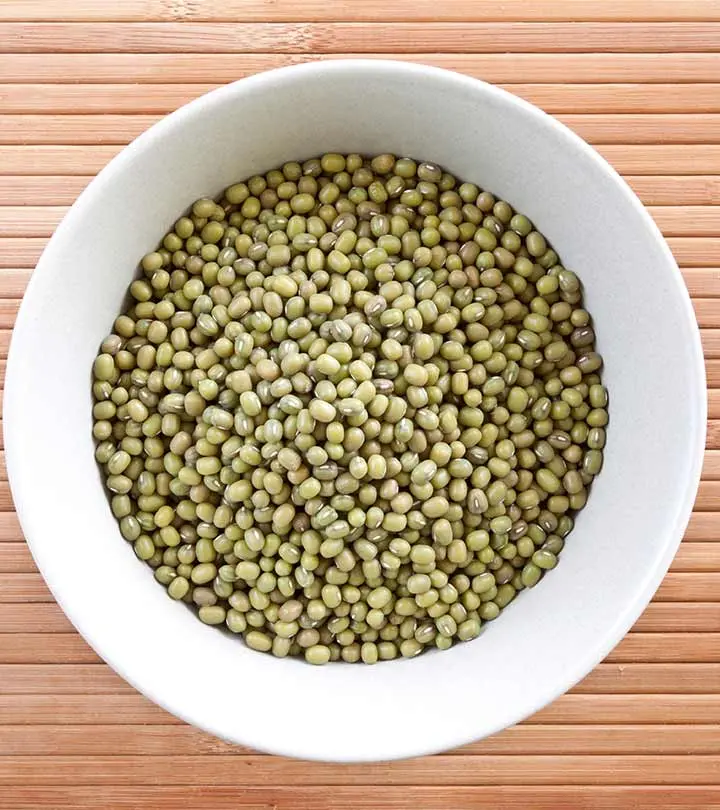

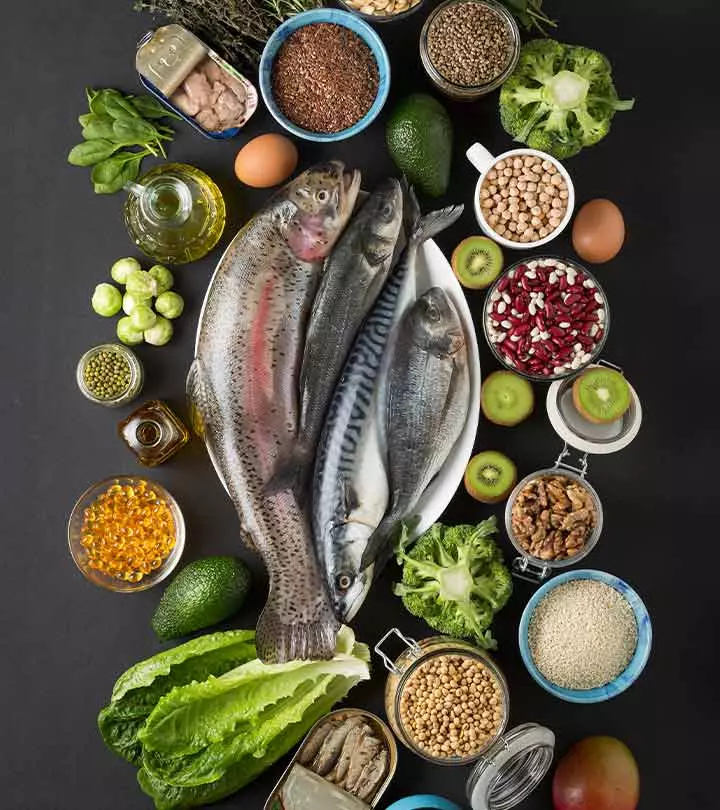


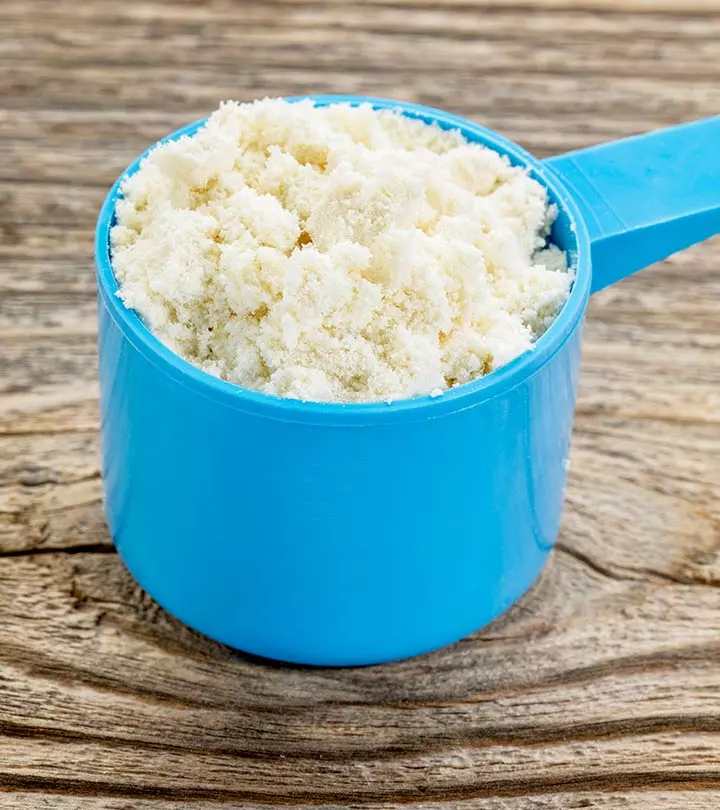



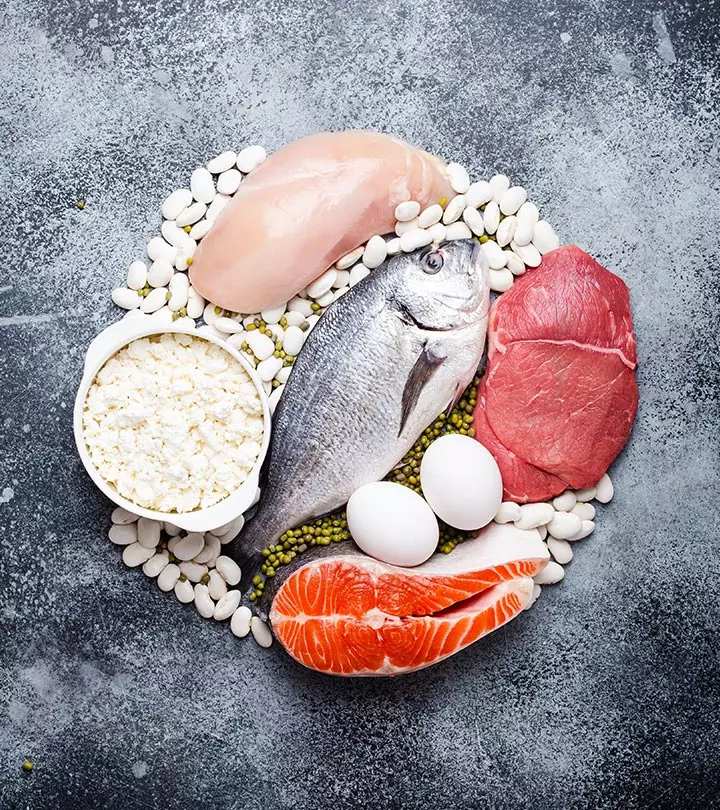
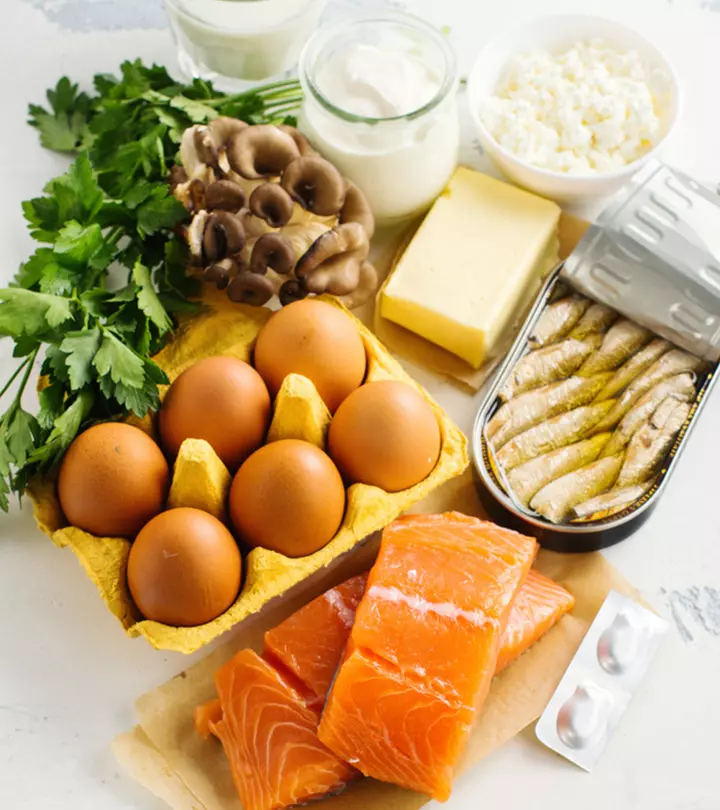



Community Experiences
Join the conversation and become a part of our empowering community! Share your stories, experiences, and insights to connect with other beauty, lifestyle, and health enthusiasts.